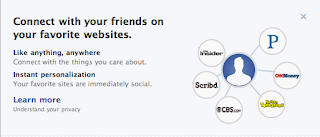
In Parts I-V stated the following: Facebook allows its users quick and simple communication on a pleasant interface with millions upon millions of fellow users and the ability to individualize one’s profile information.
In my last entry, I discussed the “millions upon millions of fellow users” portion of my original statement. I looked at how Facebook has been able to acquire such a large population base, and attempted to solve the paradox intrinsic to that question. We then examined the psychology of Facebook “friendships,” paying special attention to the limits of the brain, sensory system, and maximum emotional capacity. Finally, I asked if these “friendships” are just brief acquaintances or a new kind of human relationship evolving since the onset of the internet. Yet we were left with the following question: Can human interaction evolve this drastically within such a short timeframe?
I would like to wrap up this series about Facebook’s effects on social interaction by looking at the last part of my original statement: “the ability to individualize one’s profile information.” As previously discussed, Facebook is unique from the internet’s previously most popular social networking site, Myspace, because of its “corporate” or genuinely considered more professional appearance. Although Facebook allows its users a certain level of personalization (through photo albums, profile pictures, and personal information areas), the general appearance of one’s profile is largely uniform. As you can see from Sean Posada’s blog entry below, Facebook users cannot change from the classic blue and white format. It seems this uniformity between profiles keeps Facebook unique from other social networking sites in which you can personalize or reformat many, if not all, profile aspects. Many users believe this is an advantage to using Facebook, as most of the profile is “done” for you and cannot get aesthetically out of control.
There is a certain weight that the “Information” tab carries for Facebook users, particularly the “Basic information” section. This profile area offers viewers the user’s fundamental characteristics, yet they contain some of the most socially contested details on the internet. The “Interested In” and “Religious Views” areas have been a great source of individualistic expression, generally providing users with the first step in accepting and expressing themselves in a public fashion. The question arises whether this is a healthy alternative to conversation with friends and family over such issues. On the one hand, this medium gives users the advantage of a certain degree of confidence which other, more intimate situations might not grant them. On the other hand, this type of self-expression skips over the development stages of a self-concept and allows users to immediately publish their personal thoughts and feelings to a global audience. When talking yesterday with a former academic ahdvisor, the topic of personalization via social networking sites came up. My advisor stated, “Nothing’s private anymore with Facebook.” I couldn’t help agreeing. The handful of questions Facebook initially asks of its users subject them to instant social stigmas and profiling by their peers, families, and superiors.
With social networking sites, it is impossible to split your worlds. What I mean by this is that a Facebook user cannot choose which “friends” can know he’s an atheist and which cannot, without restricting larger parts of his profile. People using Facebook for “business networking” reasons cannot mix their details with their friends and family if they are to keep up a professional appearance. Thus, the personalization aspect of Facebook becomes a blessing and a curse.
In addition, Facebook has recently pushed its users to utilize Facebook as an “organizer” for their other social websites. The ad at the beginning of this post urges users to register their other sites through Facebook for “instant personalization.” This begs me to ask, how much information is too much information? It’s a slippery slope to the end of privacy.
No comments:
Post a Comment